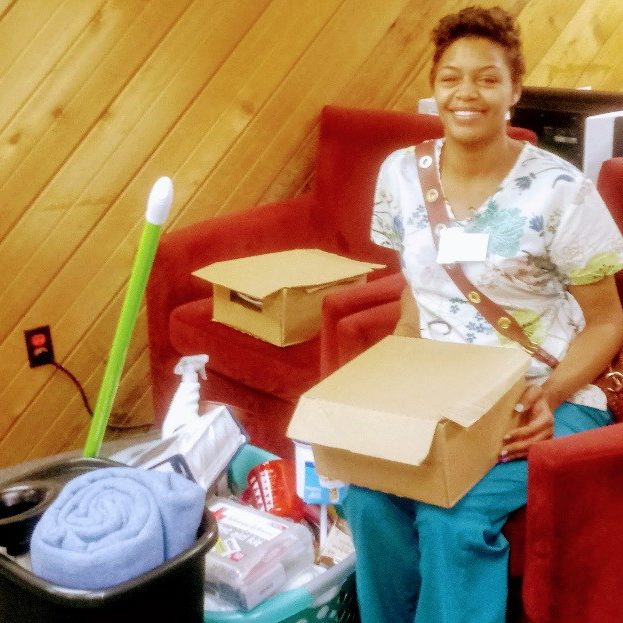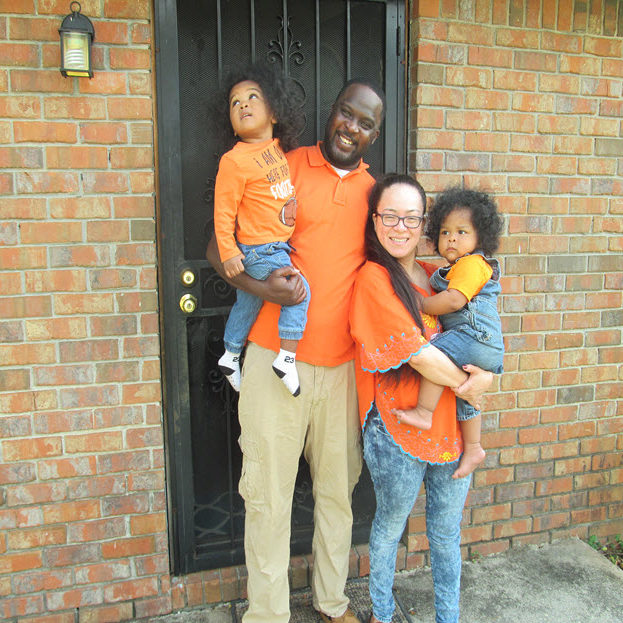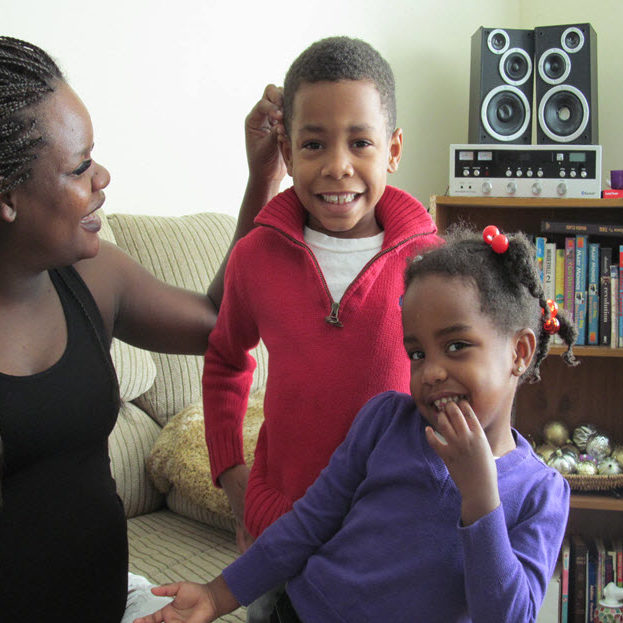It's wonderful to be able to play outside in my own backyard.
-Annie, age 9
OUR IMPACT
OUR IMPACT
Each year, Decatur Cooperative Ministry serves over 1,000 at-risk or homeless children, women, and men. Over 50% of those we serve are children under the age of 18.
Thanks to the generosity of our many community partners, volunteers, and donors, the majority of our clients graduate to more stable housing. Below are just a few of our clients’ successes:

Althea’s Story
Althea's sudden descent into homelessness reads like most parents’ worst fear. While her story is traumatic and heart-wrenching—and for most of us, something we experience only in our nightmares—it is also, sadly, all too common.
Althea was a hard-working single mother of four children. Her Certified Nursing Assistant salary provided her family a cozy second-story apartment. Life was hard, to be certain, but Althea made ends meet, and things were going well.
And then, as it so often does, life took a turn.
Althea’s eldest son was gunned down. In just the blink of an eye, the family’s whole life changed.
As her eldest lay in a hospital bed recovering, Althea realized she and her family would never feel safe in their community again. Ultimately, she made the difficult decision to send her younger children to live with extended family. With them safely with family, Althea stayed vigilantly at the bedside of her eldest, foregoing valuable hours at work in dedication to his healing. Eventually, she began falling behind on bills.
Sadly, things became even more complicated. Doctors informed Althea that her son would be confined to a wheelchair for the rest of his life. The beautiful home the family had made together—that one on the second floor—was now absolutely out of the question.
With medical bills mounting and rent past-due, Althea knew she had no choice. Fighting eviction was useless; renting a new place also wasn’t feasible. Again, she was left with a terrible decision: to move her already traumatized family into an extended-stay hotel. Althea and her second-oldest child moved into the hotel. In short order, her eldest was released from the hospital and joined them. (In what seemed like a rare instance of good luck, it turned out he didn’t need a wheelchair after all.) The stress of having her family split up was overwhelming to Althea. Her greatest hardship, she says, was dealing with that stress without burdening her children.
It was during this period that Althea began reaching out to community-based resources and was eventually connected to DCM. DCM worked fast to secure permanent housing for Althea and her family. Staff hand-delivered checks for a rental security deposit and the first month’s rent.
Althea and all four of her kids are now reunited, living in a beautiful and safe 3-bedroom, 2-bath single-family home in DeKalb. Though it will take time to recover from the combined traumas of violence and homelessness, thanks to DCM and supporters like you, Althea and her family on their way to building healthy lives filled with peace, hope, and opportunity.

The Morton Family’s Story
When William and Cochill arrived at DCM’s Veteran Supportive Service satellite office at Fort McPherson in December 2016, their lights had been cut off and they were facing eviction.
Cochill had recently been laid off; William—a Post-911 Veteran who had served and was wounded in Afghanistan—had been fired from his job due to mood swings resulting from PTSD.
Once the family presented DCM’s SSVF case manager with proof of their situation, he immediately expedited a check to have their utilities turned back on. The family was then provided with four months of rent and utility assistance to further stabilize their current housing.
DCM connected the Mortons to the HUD VASH program, which helped to stabilize their housing long-term. They were connected to a credit care agency that helped them create a budget that significantly reduced their expenses. Cochill was connected to employment services, which helped her to gain new (and higher paying) employment. William was also connected to the Wounded Warrior Project from whom he received assistance for his PTSD and physical injury.
Today, William and Cochill have both regained employment and the family has obtained housing stability. Cochill says “DCM really helped us. It was a stepping stone to get us to the next level. DCM helped us get back to our feet like we were before.”

Jackie’s Story
Jackie and her two children were living with friends when they were unexpectedly asked to leave.
Though employed, Jackie’s income was insufficient to obtain housing; her criminal background posed another barrier to stability. With no other choice, the family moved into an emergency shelter in Atlanta. Shortly after moving in, Jackie concluded that the shelter was unsafe and a poor fit for her family. When she heard about Creekside Forest Apartments—with low rental rates and a lenient approval policy—she jumped at the opportunity to move out of the shelter and into her own home.
When the family moved in in December 2015, Jackie immediately realized something was wrong. Her apartment had no heat; the family had to use space heaters (and occasionally the oven) to stay warm. Her children were nearly removed by case managers due to these conditions.
Though the apartment was supposedly under renovation, by late spring these promises had failed to come to fruition. Even worse, Jackie noticed mold growing in her apartment. Complaints to management went unanswered; repairs would be done based on seniority, she was told—they’d get to her eventually. By June, there was no one in the rental office.
Jackie started a petition and alerted a district commissioner to the deplorable living conditions. Now in her second trimester, Jackie was overwhelmed. “I really don’t like having to ask people for help. It was just so overwhelming. Me being pregnant, I was so emotional. I was so scared.”
As the conditions at the Creekside Forest Apartments became public, several nonprofits joined together to offer rehousing services to those affected. Jackie reluctantly attended an event for residents in need of services. Jackie was certain the event would be a waste of her time; she thought she was on her own.
Then, one encounter changed her life.


